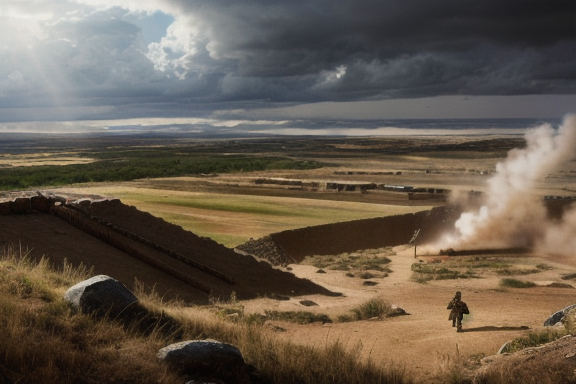The topic of war in Israel is both historically significant and deeply rooted in biblical narratives. Understanding the biblical perspective on war is crucial for gaining insights into the religious, cultural, and geopolitical dynamics of the region. The Bible provides us with a rich tapestry of stories, teachings, and prophecies that shed light on the complex relationship between war, faith, and the nation of Israel.
By exploring the biblical narratives related to war in Israel, we can uncover valuable insights into the divine guidance, principles, and consequences associated with armed conflicts. This understanding can deepen our appreciation for the complexities of war, its impact on individuals and societies, and the importance of seeking peace and justice.

The Bible’s teachings on war also provide guidance on how individuals and communities should navigate the challenges of conflict. It highlights the importance of seeking divine wisdom, practicing justice, and promoting reconciliation. These teachings can be applied to contemporary situations, fostering a deeper understanding of the complexities of war and encouraging individuals to pursue peaceful resolutions.
Furthermore, gaining insights into the biblical perspective on war in Israel can foster interfaith dialogue and promote mutual understanding between different religious and cultural groups. It allows us to appreciate the shared heritage and values that underpin various faith traditions and encourages respectful engagement in discussions surrounding war, peace, and the pursuit of justice.
Historical Context
In order to understand the biblical perspective on war in Israel, it is important to delve into the historical context surrounding these events. The Bible contains numerous accounts of wars and conflicts that took place in Israel, shaping the nation’s history and influencing its people. These events hold significant meaning and offer valuable insights into the complexities of war and the moral dilemmas it presents.
One of the key battles in Israel’s history is the Battle of Jericho, which is described in the Book of Joshua. The Israelites, led by Joshua, waged war against the fortified city of Jericho. Through divine intervention, the walls of Jericho collapsed, allowing the Israelites to conquer the city. This victory served as a testament to God’s power and the faithfulness of the Israelites. It showcased the importance of trust in God and obedience to His commands in times of war.
Another significant conflict is the Battle of David and Goliath, recounted in the Book of Samuel. This encounter between the Philistine giant Goliath and the young shepherd David represents the triumph of courage, faith, and divine intervention. Despite being an underdog, David’s unwavering belief in God’s strength enabled him to defeat Goliath with a single stone from his sling. This story highlights the idea that true victory in war comes not from human might or weaponry, but from the power of God.
The Israelites also faced numerous struggles against neighboring nations, such as the Philistines, Assyrians, and Babylonians. These conflicts served as tests of the Israelites’ faith and commitment to their covenant with God. They also revealed the consequences of disobedience and idolatry, as the Israelites suffered defeat and were exiled from their land. These events remind us of the importance of remaining faithful to God’s commandments and seeking His guidance during times of war.
**Throughout Israel’s history, wars were not simply battles between nations, but spiritual and moral tests for the Israelites. These conflicts demonstrated the need for reliance on God, obedience to His laws, and the preservation of the covenant between God and His chosen people.** Understanding these historical events and their significance provides a deeper appreciation for the biblical perspective on war in Israel and the lessons it imparts to believers today.
Biblical Teachings on War in Israel
When examining the scriptures, we can find various references to war in Israel, shedding light on the biblical teachings surrounding this topic. The Bible offers insights into God’s role in warfare, as well as moral and ethical considerations. Let us delve into these teachings and explore their significance.
God’s Role in Warfare
Throughout the Bible, we see instances where God intervenes in wars involving Israel. In the Old Testament, we read about the conquest of Canaan, where God commanded the Israelites to engage in battle to claim the Promised Land. **God’s presence and guidance were crucial for their success**. Furthermore, in the book of Exodus, we learn of the miraculous parting of the Red Sea, which allowed the Israelites to escape from the pursuing Egyptian army. These examples demonstrate that God can play an active role in warfare, supporting His people in their struggles.
Moral and Ethical Considerations
When it comes to ethical considerations in biblical warfare, we find that the Bible emphasizes the importance of righteous conduct and justice. In Deuteronomy 20:10-17, guidelines are provided for engaging in warfare. **These guidelines promote fairness, sparing non-combatants, and offering peaceful terms to cities outside the Promised Land**. Additionally, in the New Testament, Jesus taught His followers to love their enemies and to turn the other cheek (Matthew 5:38-48), promoting a message of peace and reconciliation. These teachings highlight the ethical principles that should guide the actions of believers even in times of conflict.
The Wisdom of Proverbs
Within the book of Proverbs, we find wisdom that can be applied to the context of war in Israel. Proverbs 24:6 states, “For by wise guidance you can wage your war, and in abundance of counselors there is victory.” This verse emphasizes the importance of seeking wisdom and counsel when faced with the prospect of war. It encourages leaders to consider multiple perspectives and make informed decisions rather than acting impulsively. **This wisdom can be applied to both ancient and modern contexts, reminding us of the value of careful consideration and strategic planning**.
Curiosities and Lesser-Known Facts
Did you know that the Hebrew Bible contains a book entirely dedicated to war? The book of Joshua chronicles the Israelites’ conquest of Canaan, providing historical and spiritual insights into the conflicts they faced. Additionally, the Bible also mentions the use of military strategies and tactics. For example, in 2 Chronicles 26:15, we learn that King Uzziah of Judah constructed war machines to aid in defending his kingdom. **These lesser-known details offer a glimpse into the sophisticated military capabilities of ancient Israel**.
Modern Application
In order to understand the current political situation in Israel, it is important to analyze the complex dynamics that exist within the region. Israel, situated in the Middle East, has faced numerous challenges and conflicts throughout its history. The ongoing conflict with neighboring nations and the threat of terrorism have resulted in a delicate balance between maintaining national security and pursuing peace. The role of war in Israel’s self-defense has been a topic of intense debate and scrutiny.
Israel’s self-defense: Israel has consistently asserted its right to self-defense in the face of threats to its security. The nation’s military, the Israel Defense Forces (IDF), plays a crucial role in safeguarding the country and its citizens. The IDF has been involved in various military operations, both defensive and preemptive, aimed at protecting Israel from external aggression and ensuring its survival.
Different perspectives on the use of force: The use of force in the context of war is a deeply divisive issue, and opinions on the matter vary widely. Some argue that military action is necessary for self-defense and the preservation of national sovereignty. They believe that Israel has a right to protect its citizens and ensure their safety in the face of threats. Others, however, advocate for peaceful resolutions and diplomatic negotiations as the preferred means to address conflicts.
It is important to note that the Israeli government and its policies regarding war and self-defense are shaped by a multitude of factors, including historical context, geopolitical considerations, and international relations. The situation is further complicated by religious, cultural, and ideological differences, which add additional layers of complexity to the issue.
The role of international law
International law plays a significant role in shaping the perception and application of war in Israel’s self-defense. Israel, like other nations, is bound by certain legal frameworks, such as the United Nations Charter and international humanitarian law, which outline the principles and limitations of the use of force. These legal frameworks provide guidelines for assessing the legality and proportionality of military actions.
Curiosity: Israel has been subject to scrutiny and criticism from various international organizations and bodies regarding its military actions. The United Nations, in particular, has been actively involved in monitoring and addressing the Israeli-Palestinian conflict. The complex legal and political landscape surrounding Israel’s self-defense further contributes to the ongoing debate and discussion.
Public opinion and moral considerations
Public opinion plays a significant role in shaping the discourse surrounding war and self-defense in Israel. There are diverse perspectives within Israeli society, ranging from those who support a strong military response to those who advocate for a more conciliatory approach. Moral considerations, such as the protection of civilian lives and adherence to ethical standards, also factor into the discussion.
Quote: “We must remember that the use of force should always be a last resort, employed only when all other avenues for resolution have been exhausted.” – Israeli Prime Minister
It is crucial to engage in open and respectful dialogue to understand and appreciate the complexities inherent in the Israeli context. By considering the historical, political, legal, and moral dimensions, we can gain a deeper understanding of the role of war in Israel’s self-defense and contribute to meaningful discussions on the topic.
Frequently Asked Questions (FAQ)
Q: Does Israel have the right to defend itself?
A: Yes, Israel, like any other sovereign nation, has the right to defend itself against threats to its security and the safety of its citizens. This right is recognized under international law.
Q: Are there alternatives to military action for resolving conflicts?
A: Yes, diplomatic negotiations and peaceful resolutions are widely advocated as alternative means to address conflicts. However, the efficacy and feasibility of these alternatives depend on the specific circumstances and parties involved.
Q: How does the international community view Israel’s self-defense actions?
A: The international community holds diverse opinions on Israel’s self-defense actions. While some nations and organizations support Israel’s right to defend itself, others criticize and question the proportionality and legality of its military actions.

Rockin’ the faith, one verse at a time!
Growing up, the Bible’s stories deeply impacted me. Now, with over 15 years of preaching experience, I blend timeless teachings with modern technology, making them relevant for today’s world.
Bible Hub Verse is my platform to share historical insights and thought-provoking articles, exploring both familiar and uncommon Christian topics. My passion is building a welcoming online space for everyone to learn, grow in their faith, and discover the Bible’s enduring message.
Join the journey!
God bless you.









